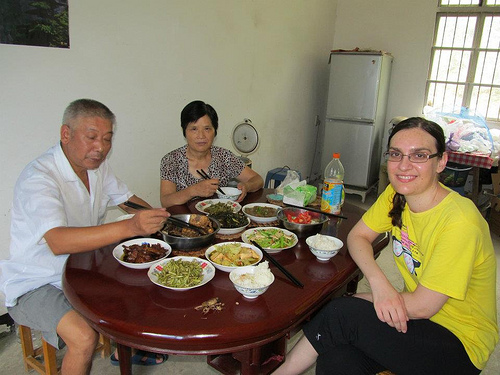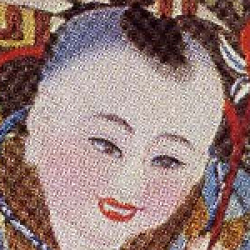 More than a week ago, my Chinese mother-in-law spent a whole day helping someone plant their rice paddy. That “someone” turned out to be a relative.
More than a week ago, my Chinese mother-in-law spent a whole day helping someone plant their rice paddy. That “someone” turned out to be a relative.
“She was out helping our Jiujiu plant the fields,” my sister-in-law told me at dinner. Jiujiu is the Chinese word for uncles on the mother’s side. But as far as I knew, we only had two uncles on John’s mother’s side — Da Jiujiu and Xiao Jiujiu. Neither of them needed assistance in the fields, especially Xiao Jiujiu who just became our village secretary. How could she possibly help someone called “Jiujiu?”
“Oh, that’s the godfather’s little brother.” Godfather, as in John’s godfather (John needed a godfather because his Chinese zodiac sign, the horse, conflicted with his father’s, the rat).
Then I remembered that, some time ago, my Chinese mother-in-law told me the godfather was a relative — but I’d forgotten how and asked my sister-in-law. “He’s the Gunainai’s son.”
“Gunainai?” I felt as if I was getting tangled in the branches of this family tree.
Then my Chinese mother-in-law, who had come back and overheard our conversation, sat down to explain things. “Gunainai is Waigong’s older sister,” Waigong being the word for grandfather on the mother’s side. “I call her Guma, you call her Gunainai.”
“So many different names, it’s confusing!” I said that, in the US, we used the same word for grandparents, aunts and uncles on both sides of the family. But in the process of explaining this, I used ‘Ayi’ to refer to aunt on the father’s side, which is all wrong.
My sister-in-law wrinkled her brow. “Don’t you mean ‘Shenshen’?”
“Sorry, Shenshen. So, who do I call ‘Ayi’ then?”
“Ayi is my younger sister,” my Chinese mother-in-law said.
“And you call Ayi’s husband Yifu,” added my sister-in-law.
I slapped my forehead. “Terrible! Last time I saw Ayi I referred to her husband as ‘Shushu.'”
My sister-in-law shot me a sympathetic smile. “Don’t worry about it. It’s easy to feel as if you’re lost.”
Then as if I wasn’t already lost, she looked at her baby girl and said, “she will call John’s oldest brother Bofu.” Bofu? I’d never heard the term “Bofu” in my entire life — at least, the life that had included my Chinese family.
But I have to wonder: will it take me my whole life to keep all of these names and relations together?
Have you ever been confused by all of the different names for Chinese relatives?

Yes… it will take you years and years and years, especially if you don’t live with them full-time, all year round!
I was raised in Canada, where everyone was just “aunty” and “uncle.” My parents moved me back to Malaysia at the age of 11… and introduced me to a large extended family of 11 of my mother’s siblings, 7 of my father’s siblings, and all their husbands and wives and children and in-laws and whatnot. Oh. My. God.
15 years later… I do alright when it comes to my parents siblings, but for my uncle and aunties by marriage… utter confusion.
Good luck!
I bumped into the same problem last weekend when out for a stroll with my wife and daughter, we bumped into “Ernainai”, and my wife asked Ernainai, “Do you recognise me?” I asked later who this was, and Ernainai is not a blood relative, but somebody of a nainai age relative to my wife who had a bit of a caring role to play in my wife’s childhood.
And to further confuse things, everybody says “my eryi” or “my dagu” or whatever, and I have to run through the family tree to figure out who their eryi or dagu is relative to me. It certainly keeps the head spinning.
I think we also see a couple of regional differences, in that who (relative to you, of course) you call ‘shenshen’ I think I would call (relative to me, of course) ‘shen’er’ – and no, that’s not the infamous Beijing pirate talk, the erhuayin has meaning. And the term ‘bofu’ I have read in books and heard on TV, but I can’t figure out what my northwest of Beijing equivalent would be.
So some time ago I just decided that these Chinese family terms have to be learned within a family context, otherwise there’s no way you’re going to get your head around them. And they certainly keep my head spinning figuring out who’s who in relation to who.
In my large Asian family, even after 8+ years I still do not know all the aunts and uncles given names. One of the reasons for that is it is hard to associate a gender with the Asian names. For example, names like “Thao”. I really had no idea at first of the gender it was associated with untill someone said to me” That’s auntie Thao. Oohhhh ok…now I got it..lol
Also, it took about 5 years for the family to “warm up” to me enough to talk with me so I could get to know them as individuals. Now I know which kids go with what aunt/ uncle, but I still just refer to them as that… hello Auntie, hello Uncle… I can’t image what its like to have different names for each association/ relationship (on top of knowing their give names)!! Keep at it!! 🙂
-Laura
I am confused by the names, and I’m not even trying to associate them with family members yet (although that might be the only way I learn, as Chris said)! Although, to be fair, my husband struggles to remember who’s who in MY family too, since the names are foreign to him. 🙂
I wonder if there’s a handbook that clarifies all these titles, ’cause there should be!
To make things more confusing, some of these titles differ by region, dialect, and individual family preferences…
Luckily I rarely see these extended relatives so I just wait for an introduction each time.
Jumping Jiminey Crickets!!! Ok, I cannot even wrap my head around this today!!!! It kindof sounds like a tongue twister gone wrong.
Good luck to you though!!!!
Well, well, well..Interesting article. You can go coo-coo really, even for a Chinese like me. I always have a problem remembering who is to be addressed as what. LOL.
It can make you dizzy, trust me. L O L.
I feel your pain! My kids call my mom lao lao, but other kids who speak Mandarin call their maternal grandmas po po. And that’s just in Mandarin. I have a friend who calls his (Fujianese, I think) grandmother mah mah. The ah sound drags out longer than a mother ma ma. Oy vey!
Yeah these terms, as others pointed out, are very regional. For example, in Yunnan my kids call my brother in law “Da Die” and my sister in law “Da Ma,” and their kids call me “Niang Niang,” which isn’t correct at all in putonghua. There’s also a load of confusion because my husband is really young for his generation (his dad was in his 50s when my husband was born), so he has people he has to call “ge” who are like, 80, and then my son has other kids who have to call him “xiao ye,” stuff like that. I remember the terms for the immediate relatives but honestly I don’t even bother with most of them because there are just too many, and coupled with the dialect and then the generation stuff, it is a major headache.
I think it’s also confusing when Chinese people call their cousins their sisters or brothers. Instead of saying biaojie, they might just say jiejie.
Oh yes, even as a Chinese person (but pretty much 99% English educated), I am utterly flummoxed by the intricacies of the honorifics in a Chinese family. English is also pretty confusing when it comes to first, second, third cousins (once or twice removed)?! I just call everyone shu shu or ah yi and just wait for the new year festival to be over. 🙂
Thanks for the comment, James! LOL! Shushu/ayi are always great fallbacks when you’ve forgotten the appropriate honorifics. 🙂